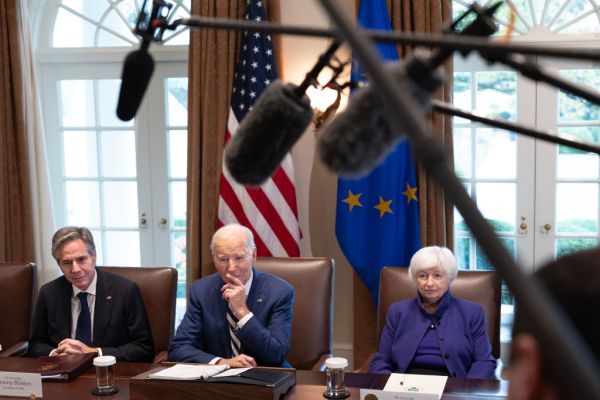Former acting ICE director Thomas Homan apparently knows—or at least thinks he knows—who will be the next ICE director if Donald Trump wins the November election: former acting ICE director Thomas Homan.
“If Trump gets back in in January, I’ll be on his heels coming back. And I will run the biggest deportation operation this country has ever seen.” So Homan thundered at NatCon 4, the fourth annual conference of the so-called national conservatives, a right-wing faction aligned with Donald Trump.
Homan, who was never confirmed as Immigration and Customs Enforcement director, was acting director from January 2017 through June 2018. He’s closely associated with the family-separation policy. This Washington, D.C., conference is basically a big Trump campaign rally, and Homan is a perfect distillation of the Trump-guy style: He uses a lot of mild profanity, in the familiar TV-cop mode, speaks about himself in the third person a great deal (referring to himself that way about a dozen times in a relatively short presentation), and relies on that weird combination of triumphalist bluster and poor-me-the-Washington-Post-is-so-mean-to-us conservative-victimhood stuff that is the hallmark of the genre. He couldn’t be any Trumpier if he were selling third-rate pillows.
This isn’t the first time he’s made that promise about mass deportation. In 2023, he told Fox News: “People say, ‘How are you going to remove millions?’ The answer is: One at a time. No one’s off the table. If you’re in the country illegally in violation of immigration law, you are a target.”
The mood of the audience at the immigration panel was borderline hysteria, but the mood of the panel itself was relatively placid. That’s part of the weirdness of NatCon: These people talk about themselves as if they were this radical new movement thinking big thoughts nobody has ever thought before, but on the immigration panel—and immigration is the issue for a lot of these people—you’ve got Mark Krikorian saying the same things in the same way he’s been saying them for decades. That’s no slight to Krikorian: Agree with his immigration views or detest them, he is a smart activist with a long record on the issue, and a serious man. Too serious, in fact: During Q-and-A, one member of the audience insisted that the recent rush at the border is all about importing voters before the presidential election, and, when Krikorian demurred and suggested that there might be more to it, she screamed at him that he didn’t really understand the issue. Krikorian has been director of the Center for Immigration Studies for a quarter-century, but the lady who saw something on Facebook last week is sure that he’s just a patsy who doesn’t get it. But NatCon 4 isn’t Krikorian’s first rodeo, and that wasn’t his first clown.
It isn’t just Krikorian, of course. Wandering around this gathering of the new new new thing on the right, I see endless people I know from the old old old version of conservative activism, including several veterans of National Review cruises. And there’s my friend and former National Review editor John O’Sullivan, who runs a think tank in Budapest these days, and former National Review publisher Jack Fowler, and sundry old-line personifications of the “dead consensus.” Panelists heap praise on Ronald Reagan and quote William F. Buckley Jr.
Unlike a lot of the people you meet in these quarters, Krikorian has a pretty well spelled-out policy agenda. The problem with the asylum system, he argues, isn’t that the system is abused, but that the system itself creates bad incentives and essentially robs democratic governments of the ability to make political decisions about who enters and on what terms.
So, what to do?
“Fixing the problem with asylum must start with withdrawing from the 1951 Refugee Convention and the Protocol [Relating to the Status of Refugees].” Just that? “And the Convention against Torture, and the International Covenant on Civil and Political Rights. All of those create rights for”—his word—“infiltrators.”
That illegal immigrants are infiltrators in a more formal sense—part of a program undertaken by Beijing—is very much on Homan’s mind. “Something is coming,” he says. “You don’t have 57,000 Chinese military-aged males enter the country without cooperation from China.” And it isn’t just China: “It’s 32,000 Russians. It’s coming from Turkey, Uzbekistan. God help us.”
Without discounting the possibility that the ladies and gentlemen in Washington are grossly underestimating the Uzbek menace, it is possible that some of these threats are being exaggerated. Theo Wold, another panelist, speaks with a shaking voice of the “ever-increasing number of young women raped and murdered by illegal aliens present in this country,” although such crime is not, in fact, ever-increasing. Wold is a Claremont Institute guy and a former solicitor general of Idaho, and he rages that liberal immigration rules combined with corporate diversity programs disadvantaging “native-born whites” amount to the “colonization of America.”
Kevin Lynn of Progressives for Immigration Reform closes out the session by arguing that the problem is immigration per se, not illegal immigration or the anarchy at the border. He describes the attitudes of Silicon Valley executives as: “Please replace us, just do it legally.” Weirdly, he attributes that sentiment to Elon Musk of Pretoria, who was a foreign student in Canada before he was an immigrant to the United States. Astounding as the fact may be, the guy who made his fortune in America after relocating from South Africa via a third country has a view of immigration that is not identical to that of the former solicitor general of Idaho.
If the so-called national conservatives have different ideas about immigration than the old immigration restrictionists did, they haven’t thought them through any better or become any better at explaining them.







Please note that we at The Dispatch hold ourselves, our work, and our commenters to a higher standard than other places on the internet. We welcome comments that foster genuine debate or discussion—including comments critical of us or our work—but responses that include ad hominem attacks on fellow Dispatch members or are intended to stoke fear and anger may be moderated.
With your membership, you only have the ability to comment on The Morning Dispatch articles. Consider upgrading to join the conversation everywhere.